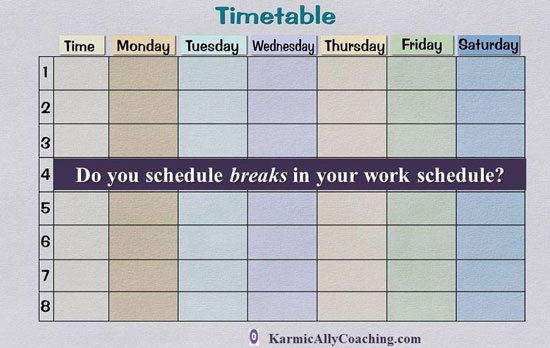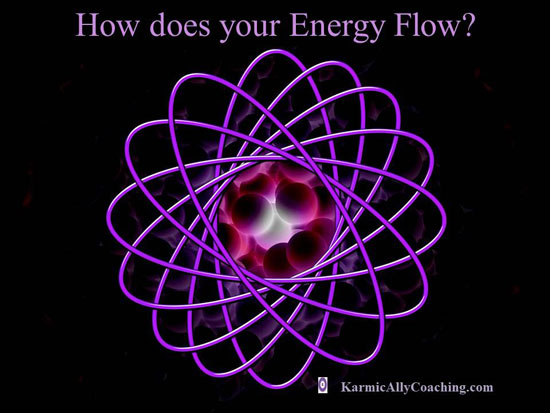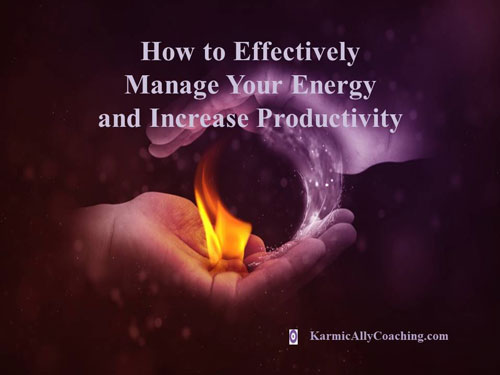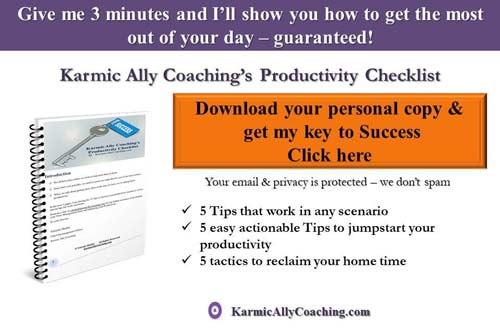This post has already been read 625 times!

In the first part of this blog post series, we explored energy management. I shared 3 methods to manage your energy for better mental, physical and emotional health.
We touched on working with our natural rhythms.
In this second part, we’ll explore how to manage that energy and combine it with time management using our natural rhythms. This will enable us to be truly productive without experiencing burnout.
Energy Management vs. Time Management
What’s more important when it comes to productivity – energy management or time management?
I’d say both are important and work in tandem.
You’ve likely heard the old adage, “Life is a marathon, not a sprint.” If you’re trying to manage your time effectively without paying attention to your energy management, you may end up with sprints rather than finishing the marathon of life.
Experts are now saying that productivity and success have more to do with how you manage your energy than it does with time management.
Eating healthy, staying fit, spending time with our children and connecting with others all take time and we do have to schedule some of our pursuits.
Whether we have the energy for those pursuits is a problem that’s often overlooked.
Trying to adhere to certain times to manage everything can leave us all exhausted. So much that we’re not even able to relax and enjoy ourselves when we’ve “scheduled the time” for it.
Having a schedule is important to manage our time but without the right level of energy to complete the tasks or activities, you’re not going to achieve much. You won’t be productive.
That’s a lesson I learned as a 10th grade student when preparing for the board examinations was overwhelming not only me but all my classmates.
Fortunately, our class teacher knew we needed support, and we had an entire session on planning our daily schedule in prepping for the board exams.
He made it fun by telling us to block time using different colours . The real magic was our having to also put in blocks for rest and play and then doing 30 minutes of a subject that we found challenging.
I continued to use this technique all the way into preparing for my later examinations including those for my Chartered Accountancy qualification.
It would be years before I’d figure out that he was guiding us to use our energy and time effectively.
The key lesson here is that while you need to manage the finite resource of time, it’s equally important to manage your energy effectively.
This means taking time for recovering from those lengthy sprints you take so you can finish the marathon with ease rather than anguish.

Use these 4 tips for managing your energy effectively:
- List how you like to rejuvenate yourself. Make a list of what makes you feel refreshed, more creative and lifts your mood. Writing them down will help to remind you about the benefits of these uplifting activities. For example, watching a great series or show you’re following on television, sipping a cup of tea and listening to music can be very rejuvenating to your energy levels.
- Double the time you usually take for breaks. Don’t stick to a timetable when it comes to reviving your energy level. Take an hour rather than half an hour and have fun with whatever you’re doing.
- Reward yourself for every goal reached. Do you have lots of projects and it seems you’ll never finish them to be able to relax and enjoy yourself. Break those projects down into parts and reward yourself after you complete each one – rather than waiting until the entire project is finished.
- Make frequent recovery stops. While you’re on that mile-long sprint, you may feel the need to stop and renew your spirits and your energy. Do it! You’ll feel so much more like completing the marathon and you’ll be happier at the finish line.
Managing your energy is a much more effective way to get through life rather than putting time limits and making schedules for everything.
How does your Energy flow?
Your inner energy thermostat doesn’t pay any attention to the timetable you’ve created. Instead, you need to make your energy the most important factor in the long marathon you’re up against.
That starts with knowing your own energy flow. When you understand how your personal energy patterns ebb and flow, you can use that knowledge to support your time management strategy.

Some questions to consider:
- Are you a night person, who works late but starts slow in the mornings?
- Maybe you are an early bird who can get up before dawn, exercise, arrive early at work and have your in-box cleared before your boss arrives?
- Or are you a mid-day person who starts slow, picks up speed then tapers off in the late afternoon?
These patterns relate to your natural energy flow also called biorhythms.
You can observe yourself and note which hours are your prime working hours, the times when you can be highly productive with the least effort or tiredness.
Just make a simple chart of the day either on graph paper or on a spreadsheet-based graph.
List your waking hours on the bottom and a high, medium, low rating along the side.
Knowing your prime working hours (early bird, midday, evening) is extremely helpful in how you schedule the complicated tasks in your workday.
Your mind will be more alert, and you will have the energy to focus on complicated work.
During your off-peak energy times, gather related materials or do some aspect of the project that is less detailed and does not require a high level of creative energy or decision-making.
After using this approach for a few weeks, you’ll see what happened on those days when your time management plan seemed to derail even though you were motivated to do the work.
You simply scheduled the wrong task for your lower energy times and so your output was less than anticipated!
5 Tips on How to Manage Your Energy Levels
The varying degrees of your energy level can be your best friend or your worst enemy. Sometimes you have to have the energy to complete a task or activity and other times you seem to have the most energy when you’re trying to relax.
If you can learn how to manage your energy levels effectively, you can move ahead rather than lag behind.
Here are some tips about how to manage your energy levels so that you’re ready for anything – any time.
- Determine the times you’re most energetic. As mentioned earlier, some people are more energetic in the mornings and others are night owls. You should be able to determine from past experience which time of day you get more done. Those are the times you should schedule the most harrowing or mind bending of tasks.
- Identify what drains you of your energy. Be honest about this assessment. When you know which obstacles and situations keep you from being the best you can be, you can do what it takes to minimize them or eradicate them from your life.
- When you do have energy is it negative or positive? If you have lots of energy, but your output is all about negativity, you are likely in a constant reactive mode rather than a positive, active mode. Negative, but energetic people never seem to have enough time to get things done.
- Use your energy to make headway, not merely survive. We all have increasing demands on our time. The way that we meet it determines whether we go through life just barely getting by or having the energy to advance. Quit rushing through in survival mode simply to get things done. Choose performance over immediate solutions.
- Be consistent in the way you handle situations. When you experience energy highs and lows, you may find yourself reacting to situations according to your energy level. If you’re energetic, you can be positive, but if you’re lethargic you could react in a totally negative manner. Try to be consistent in your reactions and it will help your energy levels to be consistent.
Thomas Leonard, a highly successful financial planner and business entrepreneur says that time is an illusion – “There’s no such thing as time management. There’s only activity management in the time we’re given.” How much activity you get done in that allotted time is directly responsible for how energetic you are.
Tip: Make your activities into priorities according to your energy level.
Performing low-energy tasks at times when you’re least energetic and high-energy tasks at times when your energy level is highest can help you meet all the demands and expectations and still have time to relax and enjoy life.
How to Effectively Manage Your Energy and Increase Productivity
It’s not just experts; more people are realizing the importance of managing their energy level rather than time to increase productivity.
There are many things and tasks that can zap your energy levels and make you much less productive than you could be.
It’s possible that you may also experience low energy levels during certain times of the day. If so, you should either take a break during those times or schedule non-important tasks.
If you’re finding that certain people, tasks or times of the day are taking a toll on your energy, it’s time to assess what those problems are and do something about them.
It’s about managing your energy effectively rather than your time.
Energy levels are different from person to person. If you’re a morning person who is at the top of their game at the first crack of dawn, you should schedule the more difficult, mind-boggling tasks at that time.
Others, who are night owls, should plan their schedules the opposite.

Some other ways to effectively manage your energy to get more done include:
- Delegate – Some people have difficulty with delegating tasks to others. But if you delegate tasks that aren’t in your zone of genius or which can be done by others and allow you to focus on more critical tasks, do it. You’ll be saving the energy you would have spent on something that can clearly be completed by someone else.
- Track your tasks – There are some great online tools (such as Google Tasks) that can help you track where your time and energy is being spent. You can break the larger tasks into smaller increments; do the most difficult ones when your energy level is high and mundane tasks when your energy level is lowest.
- Get rid of distractions – Distractions can be huge energy-drainers. If you’re on Facebook, Twitter, Pinterest, YouTube and other social media sites, you may find yourself wondering where the time has gone after you’ve spent an hour on one of these sites. Disconnect to save your energy and get more done. Stop alerts and hide the sites until you have some relaxing time to devote to them.
- Refresher breaks – Some of us can spend hours at our work desks without looking up or moving around. At the end of one of these sessions, you’ll notice that your energy is drained and you don’t have much left for anyone or anything else. The remedy is to take refresher breaks – get up and stretch and move around for a few minutes. Your productivity will likely increase.
In other words, getting in sync with your natural energy rhythms can help in so many areas of your life. Work, personal life and health are just a few of the ways that managing your energy can make you a happier and more productive person.




 I adhere to the Certified Coaches Alliance Code of Ethics and Standards. A copy is available on request.
I adhere to the Certified Coaches Alliance Code of Ethics and Standards. A copy is available on request.
 Let's Talk through the Connect Form:
Let's Talk through the Connect Form: